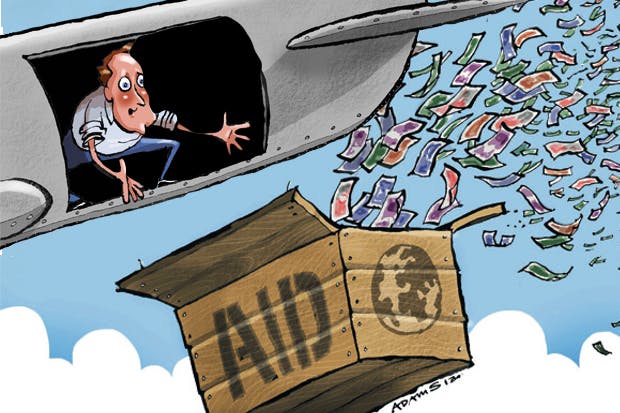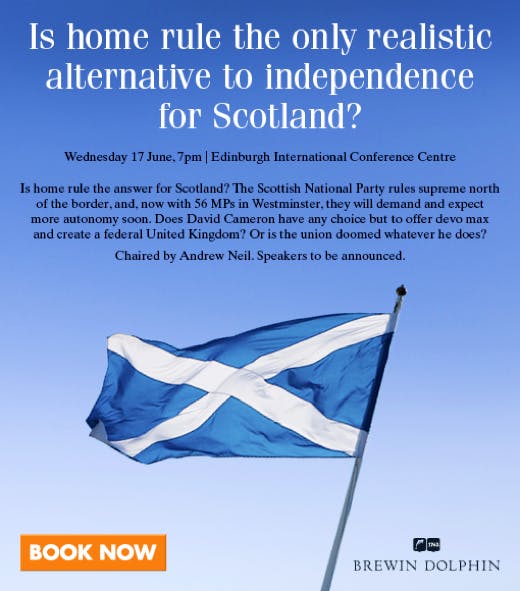In this week’s Queen’s Speech, the government promised as usual to cut red tape for businesses. But David Cameron is remarkable in his enthusiasm for simultaneously wrapping his own government in red tape. He has proposed a law to prevent the Chancellor raising rates of income tax, and in one of the last acts of the coalition he pushed through a law which commits British governments for ever after to spent at least 0.7 per cent of Gross National Income (GNI) on international aid.
There is little chance of the Prime Minister failing to meet his self-imposed spending target. Civil servants at the Department for International Development (DfiD) have proved themselves to be more than equal to the task of shovelling money in the direction of developing nations. The National Audit Office raised concerns about an apparent spending spree by DfiD of £1 billion in the last weeks of 2013 — at a time when the Treasury announced that economic growth was likely to exceed its forecast for the year, therefore requiring extra aid spending in order to hit the 0.7 per cent target.
At 0.71 per cent of GNI, Britain now has by far the highest aid budget of any major developed nation. France spends 0.41 per cent of GNI on international aid, Germany 0.38 per cent, Japan 0.23 per cent and the US 0.18 per cent. Whether the budget — £11.7 billion last year — is achieving anything useful is another matter. If David Cameron hoped that his self-imposed target would bring Britain prestige and influence, it is becoming clearer by the week that a more realistic outcome may be national embarrassment, as evidence grows of misspending.
Last week the aid watchdog the Commission for Aid Impact issued an amber-red warning for the way in which DfiD is spending money on private consultants. The commission concluded that there was too little monitoring of some projects and that help was not getting through to the very poorest groups. Meanwhile, there are reports of consultants being paid £1,000 a day.
The Public Accounts Committee raised its own concerns in January, finding that aid money channelled through a DfiD subsidiary, the Private Infrastructure Development Group, had been spent on oil and gas plants connected with fraudsters. The group’s staff were also found to have overspent on business-class flights to the tune of £75,000.
While the public image of aid tends to revolve around famine and earthquake relief, only 8 per cent of Britain’s aid budget goes on humanitarian relief. A further 20 per cent goes on medical programmes, but the bulk is spent on development projects of more dubious worth, and which seem to have aims other than bettering the lives of the poor. The £30 million being spent on ‘green mini-grids’ in Kenya, for example, seems to be inspired more by climate change policy than the desire to provide electricity for poor Kenyans. Its biggest boast, according to DfiD’s website, is that it will reduce carbon emissions by 260,000 tonnes a year.
Other schemes have the ring of personal crusades or of hare-brained PhD theses, such as the £1.5 million being spent on a project entitled ‘prevention of violence against women and girls through football’. The aim, says the bumf, is ‘to fill critical gaps in evidence on the effectiveness of sport in changing the dangerous social norms associated with violence against women and girls’.
With astonishing hypocrisy, the government is spending £30 million ‘strengthening public expenditure management’ in Bangladesh. Quite what an administration which is still running a £91 billion deficit has to teach other governments on balancing the books is not clear.
When the government defines achievement purely in terms of money spent, waste is inevitable. If David Cameron had set a target, say, for reducing HIV infection in Botswana by 2020 or reducing child poverty in Namibia by 20 per cent by 2018, and had then set a maximum budget by which this might be achieved, DfiD would have meaning-ful targets. Instead, DfiD crows about spending money as if it were a good in itself.
It is not going to be easy for the Prime Minister to extract himself from the promise to spend 0.7 per cent of GNI on aid, however embarrassing the tales of waste and excess. But there is one way he could help himself: by merging the aid target with that for defence. The government is not committed to spending 2 per cent of GNI on defence, which is supposed to be a condition for Nato membership.
Much of the defence budget over the past 20 years has been spent not on defending Britain but on helping to fight tyranny in countries which are of little direct threat to Britain. Is that not a form of aid? Indeed, as Rory Stewart, the former chairman of the defence select committee, has argued, without defence all other aid becomes worthless, because it cannot be properly dispensed without security.
David Cameron could save his blushes by redefining international aid to include military intervention in foreign countries when the intervention is not influenced by a direct threat to Britain. Do that, and the government will have no trouble sticking to the 0.7 per cent aid target — without having to fritter money on £1,000-a-day consultants and green energy for Kenyans.
Got something to add? Join the discussion and comment below.
Get 10 issues for just $10
Subscribe to The Spectator Australia today for the next 10 magazine issues, plus full online access, for just $10.















Comments
Don't miss out
Join the conversation with other Spectator Australia readers. Subscribe to leave a comment.
SUBSCRIBEAlready a subscriber? Log in